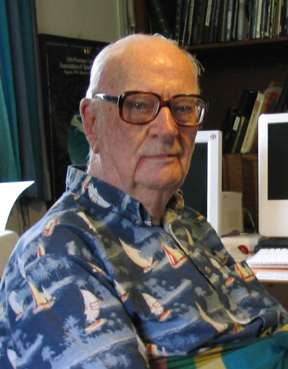„To jest puste, ciągnie się w nieskończoność i… O mój Boże, tam jest pełno gwiazd!”
ostatnie słowa nadane na Ziemię przez Davida Bowmana.
Odyseja Kosmiczna 2001
Arthur C. Clarke, właśc. sir Arthur Charles Clarke – brytyjski prozaik, pisarz fantastycznonaukowy, propagator kosmonautyki. M.in. na podstawie jego koncepcji powstały stacje orbitalne.
Jego najbardziej znanym dziełem jest książka 2001: Odyseja kosmiczna oraz nakręcony przez Stanleya Kubricka film o tym samym tytule według wspólnego scenariusza Clarke’a i Kubricka.
Wikipedia

„To jest puste, ciągnie się w nieskończoność i… O mój Boże, tam jest pełno gwiazd!”
ostatnie słowa nadane na Ziemię przez Davida Bowmana.
Odyseja Kosmiczna 2001
Odyseja Kosmiczna 2001
Źródło: Stanisław Lem, Fantastyka i futurologia
Źródło: Keith Tutt, W poszukiwaniu nieograniczonej energii, wyd. Amber, seria Tajemnice Nauki
„Nie chciałbym się upierać, Dave, ale ja jestem niezdolny do popełniania omyłek.”
Postać: HAL 9000
Odyseja Kosmiczna 2001
„Dostatecznie zaawansowana technologia nie różni się od magii.”
Źródło: Gregory Hartley, Maryann Karinch, Podręcznik manipulacji, Warszawa 2011, wyd. Bellona, s. 65.
Źródło: 2000s and posthumous publications, The Light of Other Days (2000), Ch. 6
Ah, but which king? The monarch who had stood on these granite flagstones — scarcely worn then, eighteen hundred years ago — was probably an able and intelligent man; but he failed to conceive that the time could ever come when he would fade into an anonymity as deep as that of his humblest subjects.
Źródło: 1970s, The Fountains of Paradise (1979), Ch. 11 “The Silent Princess”, p. 65
“People are people.” Bert shrugged.
“What you’re really saying is that people are animals,” Crane replied. “And I say to you, it doesn’t have to be that way. We can make a civilization, a real civilization, built on real understanding of ourselves and our universe.”
Źródło: 1990s, Richter 10 (1996), Chapter 20, “Shimani-Gashi” (p. 362)
“What we find incredible is the way that people - right up to the early 2000s!”
Źródło: 1990s, 3001: The Final Odyssey (1997) p. 32
Kontekst: calmly accepted behaviour we would consider atrocious. And believed in the most mindboggled... Nonsense, which surely any rational person would dismiss out of hand.' 'Examples, please.' 'Well... every year in some countries thousands of little girls were hideously mutilated to preserve their virginity? Many of them died - but the authorities turned a blind eye.' 'I agree that was terrible - but what could my government do about it?' 'A great deal - if it wished. But that would have offended the people who supplied it with oil and bought its weapons, like the landmines that killed and maimed civilians by the thousand.'
“So many people did it that it was no longer an obsession; it was a demographic.”
Źródło: 1990s, Richter 10 (1996), Chapter 4, “Geomorphological Processes” (p. 77)
“Of course, we in the so-called developed countries thought we were civilized.”
At least war wasn't respectable any more, and the United Nations was always doing its best to stop the wars that did break out.''Not very successfully: I'd give it about three out of ten.
1990s, 3001: The Final Odyssey (1997)
Źródło: 1990s, 3001: The Final Odyssey (1997)
1990s, 3001: The Final Odyssey (1997), p. 97, Acknowledgements
1990s, 3001: The Final Odyssey (1997), p. 88, Epilogue
1990s, 3001: The Final Odyssey (1997), p. 73
1990s, 3001: The Final Odyssey (1997)
“All the religiosity around worries me—doesn’t it you?”
Źródło: 2000s and posthumous publications, A Time Odyssey, Sunstorm (2005), Chapter 28, “The Ark” (p. 217)
“Such craziness captured media attention, but was fortunately still rare.”
Źródło: 2000s and posthumous publications, A Time Odyssey, Sunstorm (2005), Chapter 27, “The Tin Lid” (p. 207)
Źródło: 2000s and posthumous publications, A Time Odyssey, Sunstorm (2005), Chapter 24, “BDO” (p. 182)
Źródło: 2000s and posthumous publications, A Time Odyssey, Sunstorm (2005), Chapter 9, “Lunar Descent” (p. 53)
Źródło: 2000s and posthumous publications, A Time Odyssey, Firstborn (2007), Chapter 49, “Areosynchronous” (p. 313)
“You do realize how many impossible things have to be true for that to have happened?”
Źródło: 2000s and posthumous publications, A Time Odyssey, Firstborn (2007), Chapter 29, “Alexei” (p. 187)
Źródło: 2000s and posthumous publications, A Time Odyssey, Firstborn (2007), Chapter 26, “The Stone Man” (p. 172)
“Slickness of presentation didn’t imply comprehensiveness of knowledge.”
Źródło: 2000s and posthumous publications, A Time Odyssey, Firstborn (2007), Chapter 13, “Fortress Sol” (p. 77)
Źródło: 2000s and posthumous publications, A Time Odyssey, Time's Eye (2003), Chapter 21, “Return to Jamrud” (p. 181)
Źródło: 1990s, Richter 10 (1996), Chapter 22, “Richter Ten” (p. 386)
“Thinkers prepare the revolution; bandits carry it out.”
Źródło: 1990s, Richter 10 (1996), Chapter 18, “Hidden Faults” (p. 327)
Źródło: 1990s, Richter 10 (1996), Chapter 18, “Hidden Faults” (p. 323)
Źródło: 1990s, Richter 10 (1996), Chapter 12, “Continental Drift” (p. 227)
Źródło: Exploration of Space (1952)